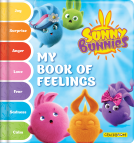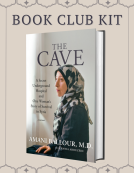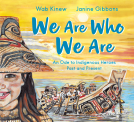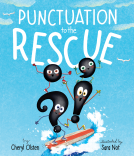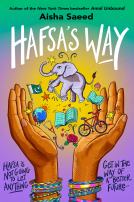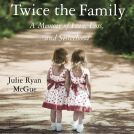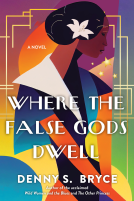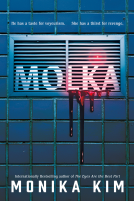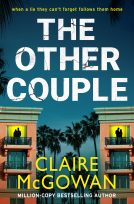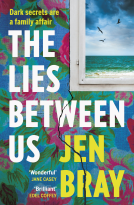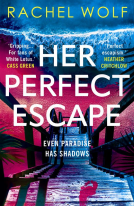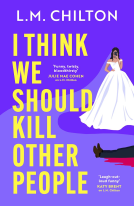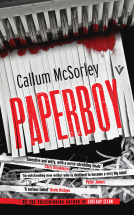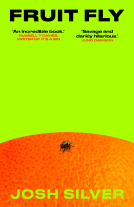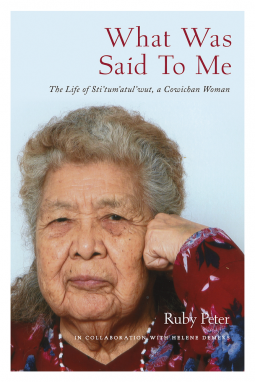
What Was Said to Me
The Life of Sti’tum’atul’wut, a Cowichan Woman
by Ruby Peter
This title was previously available on NetGalley and is now archived.
Send NetGalley books directly to your Kindle or Kindle app
1
To read on a Kindle or Kindle app, please add kindle@netgalley.com as an approved email address to receive files in your Amazon account. Click here for step-by-step instructions.
2
Also find your Kindle email address within your Amazon account, and enter it here.
Pub Date Jun 18 2021 | Archive Date Aug 31 2021
Royal BC Museum | The Royal British Columbia Museum
Description
A narrative of resistance and resilience spanning seven decades in the life of a tireless advocate for Indigenous language preservation.
Life histories are a form of contemporary social history and convey important messages about identity, cosmology, social behaviour and one’s place in the world. This first-person oral history—the first of its kind ever published by the Royal BC Museum—documents a period of profound social change through the lens of Sti’tum’atul’wut—also known as Mrs. Ruby Peter—a Cowichan elder who made it her life’s work to share and safeguard the ancient language of her people: Hul’q’umi’num’.
Over seven decades, Sti’tum’atul’wut mentored hundreds of students and teachers and helped thousands of people to develop a basic knowledge of the Hul’q’umi’num’ language. She contributed to dictionaries and grammars, and helped assemble a valuable corpus of stories, sound and video files—with more than 10,000 pages of texts from Hul’q’umi’num’ speakers—that has been described as “a treasure of linguistic and cultural knowledge.” Without her passion, commitment and expertise, this rich legacy of material would not exist for future generations
Available Editions
| EDITION | Other Format |
| ISBN | 9780772679383 |
| PRICE | $19.95 (USD) |
| PAGES | 240 |
Average rating from 23 members
Featured Reviews
In her biography, Ruby tells what it is like to grow up as an Indian native in the Cowichan Bay area in the mid-20th century. She has an impressive track record of preserving her language and culture, which is of great importance because many of the old teachings were lost when children went to residential schools. Now only the Longhouse and the winter dances remain. Read this biography by Ruby Peter (recorded by Helene Demers) if you are interested in history and oral traditions and enjoy learning about other cultures.
Storyteller
The written form of the biography stays true to the nature of the narrative. The story is written down as it was told by Ruby, with all its repetitions, colloquialisms, and imperfections. Sometimes you have to wait for an explanation because with each chapter a tip of the veil is lifted until you see the full picture.
Reading What Was Said To Me feels like having a conversation with Ruby, as if she is personally telling you her story. A story that reads smoothly and continues without pause. You just have to keep reading, and at the same time, you also have to take breaks because you can only take so many repetitions of the same part of the story in one day.
Although the suppression of the culture and language of the native Indians of Cowichan Bay, coupled with the general hardships of life, is not something to look back on with a positive feeling, Ruby’s account is not bitter or regretful. You read of her and her family’s hardships, but also of their strength and sense of community. Eventually, you will know more about the Sxwuyxwi mask, the Thi’tha line, and the Rattler. But only to a certain level, because true knowledge of these things is not for you.
Expectation versus reality
There is a certain mismatch between the expectations I had after reading the synopsis and the actual content of the biography. I expected to read more about Ruby’s efforts in the later years of her life. For example, how she worked to preserve her culture and language, and the difficulties she faced in creating the writing system and streamlining education. These are the things I wanted to read about, but they are pretty much left out.
Instead, the biography is more of a history book focusing on life and society in Ruby’s childhood and early teenage years. Don’t get me wrong: I love history and I enjoyed reading about life in the mid-20th century. It’s just that I would have preferred a deeper conversation about the language and education part.
Perseverance
If only one thing stays with you after reading this biography, let it be the power of commitment. Take care of your community and the community will take care of you. Be passionate about your culture and language, and the passion will spill over to others. And when times are tough, focus on what’s important – often the people – because better times will come. Preserve what is worth preserving for later generations. Together you will find a way.
 Librarian 455492
Librarian 455492
Thank you to the publisher and Netgalley for the opportunity to read this Advance Review Copy of "What Was Said Me." it is encouraging to see "own voices" in the publishing world.
 Heather R, Reviewer
Heather R, Reviewer
Sti’tum’atul’wut is a remarkable woman and, in this book, she gives a fascinating insight into her life story, along with the customs and values of her people, the Cowichans. The original inhabitants of this coastal place were brutally oppressed by the colonisers, who rule it still. Their lands were stolen; their children were abducted and sent away to residential schools, often for years at a time; the speaking of their Hul’q’umi’num’ language was banned; key elements of their culture and society were outlawed. It is a story common to many peoples in Canada, the US, Australia, New Zealand and many other places.
Despite it all, this woman has fought her whole life long for her identity and the means to express it. Hers has been a hard life. but an amazing one. She tells us about it in her own words and everyone should read it. She is a real hero for us to learn from.
 Annette J, Reviewer
Annette J, Reviewer
What Was Said To Me is an oral history, as recounted by Ruby Peter to Helene Demers. Ruby or Sti’tum’atul’wut, is a Cowichan Elder who has worked tirelessly to help preserve the traditions and particularly the language of her people. In the course of this work she has worked on dictionaries and grammars for the Hul’q’umi’num’. language and helped to prevent its passing into extinction. As well as learning about her conviction about the importance of language, heritage and tradition, in the course of the book she also tells her life story , which spans a time of huge social change globally and more locally.
Since the book is an oral history, it has something of a stream of consciousness feel, it is not broken down into specific chapters but rather one topic flows naturally into the next. As every effort has been made to preserve the oral testimony in its purest form, there are times where it can feel a little confusing or repetitive but these are few and far between. The book provides a valuable and educational insight into a unique culture and way of life.
I read and reviewed an ARC courtesy of NetGalley and the publisher, all opinions are my own.
 Media/Journalist 16509
Media/Journalist 16509
An important treasure of a book. I'm so glad Ruby got to pass down her stories before she passed. Highly recommended.
What Was Said to Me immediately captured my attention and did not let go until it’s final page. This is a beautiful account of one woman’s life and her desire to preserve her heritage.
This is a first-person oral history of Sti’tum’atul’wut, also known as Ruby Peter, a Cowichan Elder in British Columbia. Ruby weaves together an engaging narrative of her life from the time she was a young girl learning her traditional indigenous ways from her mother to her time as an Elder, teaching the same lessons to others in her family and community. Ruby was a major contributor in teaching and preserving the Hul’q’umi’num language. She worked extremely hard on transcribing the spoken language into a written version.
Ruby discusses various key moments in her life, from her youth to being an Elder. She talks about what it was like during WWII in her community, as well as what prejudices the soldiers faced. She discusses the atrocities of residential schools and the lessons from her mother on being a Thi’tha, which is a very private training on how to help people using prayers, songs, and things from nature. She is very clear that it is completely different from being a shaman.
Helene Demers, a longtime friend of Ruby Peter, helped to transform Ruby’s audio recordings into the book that it is today. Helene strived to decolonize the methodology by not including any academic notes or commentary in this text, which I appreciated. Originally told over nine separate recordings, the book is divided into 26 chapters.
Sometimes when reading nonfiction, I find myself drifting off and having to go back and reread the same passage again, but that wasn’t the case here; I was totally immersed in reading Ruby’s story. This is not your typical biography or memoir. There are repetitions, but that is part of an oral account; the major points need to be driven home.
Ruby passed away recently, but she will never be forgotten.
Thank you to Netgalley and the Royal BC Museum for this wonderful ARC.
This was a beautiful insight into Ruby's life. More a stream of consciousness than a well structured story but that didn't really take away from the story.
Ruby's life was truly amazing and it was very interesting to read about what Native Americans have gone through. And how despite all the difficulties she still managed to become an elder in her community and give back so much. The idea that one person can achieve this is truly inspiring. A very interesting insight into the Native American community. Highly recommend this book.
'What Was Said to Me' piqued my interest because of my pledge to learn more about Indigenous culture and history. This is a first-person oral history told by Sti’tum’atul’wut, also known as Ruby Peter, to anthropologist Helene Demers from Vancouver Island University. Sti’tum’atul’wut’s life story was recorded in nine sittings in 1997, and this book is the transcript of those conversations. The result is an engrossing story of a woman who worked tirelessly to preserve and share her heritage as well as the language of her people: Hul’q’umi’num’.
Oral histories by definition are conversations, and this reads like a conversation with your grandmother recounting stories about her life. It is therefore not as polished as one might expect. Instead, it is raw, written as shared with moments of rambling, repetition, and the use of very plain language. This reads very differently from other memoirs or biographies I've encountered. As I read, I had to remind myself of that and accept it for what it is meant to be.
Stories spanning decades are told covering Sti’tum’atul’wut’s childhood learning the traditional way of life from her mother and other Elders in the community. The book concludes with her work later in life advocating for the preservation of her language by ensuring it is written and shared. Her relationship with her mother, including lessons on the importance of imparting knowledge and traditions to benefit future generations, is prominent throughout. Her thoughts on the residential school system and its role in erasing the history of Indigenous Peoples are timely and speak to the generational trauma that continues today. According to Sti’tum’atul’wut Indigenous children who escaped the Residential School System still experienced the pressure to abandon their heritage. This is something that is personally impactful and will remain front of mind.
Later in life Sti’tum’atul’wut became a tireless advocate for indigenous language preservation. She worked with the Native Indian Teacher Education Program at the University of British Columbia, working tirelessly to get a diploma program off the ground. Her work resulted in many well-deserved accolades including honourary doctorate degrees from the University of Victoria and Simon Fraser University.
'What Was Said to Me' is an educational and timely read.
Thanks to the Netgalley and the Royal BC Museum for an advanced reader copy of this book.
I think that this book is culturally and linguistically important. In current times, as we discover more and more of the terrors of residential schools and exactly how much has been taken away from Indigenous people's in Canada and beyond, What Was Said to Me is another important book which highlights the importance of Indigenous voices and culture and the struggle to maintain that culture. This book is an amazing read and I hope everyone adds it to their bookshelf not only to educate themselves but to learn and empathize with Indigenous people.
 Book Trade Professional 845234
Book Trade Professional 845234
This book is a necessary and beautiful teaching of life from the perspective of an indigenous woman. The words are transcribed from audio recordings made with her throughout her life, and have been edited up to the date of her death this past year (2020).
Her history and that of the Cowichan tribe is of such crucial importance, especially in light of the recent discoveries at former residential school sites all over Canada. For me, it was a precious window into the world as it existed before colonization and up through the many many years of oppression, suppression, and legalized racism carried out against the Native tribes of Canada, but it was also a sacred glimpse into the healing practices, rituals and language of the Cowichan. There were many times a piece of Sti'tum'atul'wut's wisdom resonated with me, especially in the passages about how as a healer she would work on widows, orphans and those who experienced the death of a loved one.
I'm so grateful that Sti'tum'atul'wut created this oral history for all of us to consume, learn from and memorialize. I hope it becomes required reading across Canada and into the US.
A fitting book to finish on National Indigenous Peoples Day. I really enjoyed reading Sti'tum'atul'wut’s stories and I appreciate how the text maintained some of the oral features despite the difference in format. I learned a lot about Cowichan culture, medicine, and Thi’tha. Ruby also gives advice and talks about the impact of Residential Schools. Really enjoyable glimpse. Thank you to NetGalley and the Royal BC Museum for an ARC.
I received an electronic ARC of this book via NetGalley.
It feels strange to assign a star value and write a review for this book. It is a printed form of an oral history, and is alive with Sti'tum'atul'wut's voice--it is very easy to imagine being told the story verbally while reading it.
It's worth reading, and it's absolutely fascinating. I'm glad that she shared her story, and that the story is being shared with the world at large through the medium of this book. But assigning a rating is rather like rating someone's lived experience, and that feels strange.
This book is rambling and repetitive and at times confusing, and that's exactly the point. It's Sti'tum'atul'wut (Ruby Peter)'s story told in exactly her own words, as if she were telling you herself as different recollections come to her, and you can absolutely hear her voice and feel her personality coming through in a way that's much more personal than intentionally-written prose.
I have a hard time rating autobiographical work in general, and it feels even less appropriate to review this in the usual sense, given that even the 'writing style' and the flow of different anecdotes haven't been deliberately structured, but I will say that this is an incredibly important story that I'm glad is being shared. I learned so much about Cowichan ways and traditions, and there are so many lessons in Ruby's life that we can all apply to our own. The whole book is packed full of wisdom, and I highly recommend it!
A very unique take on showing the perspective and stories from an Indigenous elder. This is essentially a transcribed conversation between the elder and the author (a professor at VIU) where she shares stories of growing up in the Cowichan nation during WW2, attending a day school and being a force in her community for keeping her language alive. Wonderful read!
Thank you to Netgalley and the publisher for this ARC in exchange for an honest review.
This was such a beautiful story of a woman and her people. Ruby Peter was a a Cowichan elder who narrates the story of her hard life as an Indian native and hard work in order to protect the ancient language of her people: Hul’q’umi’num’ and their traditions and culture.
I loved it so much, it was so interesting to read and to learn more about those people that faced hardships in different ways, we feel bitter for what happened to them. I loved to read about her childhood and her mother who was an exceptional person that taught her a lot and then, as she became the elder, she taught everything to the youngsters. In this book, Helene Demers worked only on transforming Ruby's audiorecordings into a text without adding any of her commentaries, it's pure Ruby's words in this book and I really loved that.
I hope that there were more books either for kids or adults and documentaries about the native Indians' culture for the future generations. There is a lot of things that I learnt from this book and I hope that a lot of people will take the time to read this beautiful book.
 Ana M, Reviewer
Ana M, Reviewer
I received a free eARC from the author/publisher via NetGalley in exchange for an honest review.
What Was Said to Me is an oral history by Sti’tum’atul’wut (also known as Ruby Peter), and written down by Helene Demers. It is a powerful book about the life of Sti’tum’atul’wut, a Cowichan elder, and her tireless efforts to preserve her people's culture and language. Like many indigenous peoples, the Cowichan faced an oppressive genocidal regime that stole their children, their land, and the culture.
This book is at times intensely heartbreaking, and extremely uplifting. I think hearing the stories of indigenous people in their own words is so important, because they provide a doorway into the rich, living cultures and ways of thinking that are part of the greater human tapestry.
 Angie k, Educator
Angie k, Educator
This is a complicated book for me to review. I wanted so badly to like it but I just couldn't connect. I'll start with some neutral information about the book. The story is about an Indigenous Elder, Ruby, from British Columbia who is dictating her oral history to her daughter and another author. Indigenous Elders are knowledge keepers and their stories are essential elements of their cultures. Ruby tells of residential and Indian day schools, longhouses, potlatch bans, the indian act and more. She also shares elements of her culture such as Mask dances, rites of passage and funeral/mourning procedures. The novel is written in a unique way, in keeping with oral histories which are typically passed down from an elder to a younger person orally through storytelling, the novel was written through dictation. The story reads very much like a conversation with a grandparent.
In theory, this is the perfect book for me, I love learning about cultures, especially Canadian Indigenous cultures, I enjoy a great story from a grandparent, but I didn't love this book. I think that because of the way it was written, while I completely support what the authors were trying to accomplish, was at times a bit difficult to follow and while some chapters were very interesting, others were more mundane. There was a fair amount of repetition and some confusing timelines, which added to the slow pace.
I think this book is such an important piece of history and cultural information. I am so glad that it was written and wouldn't change anything about it. However, I think it is important that readers understand what kind of book they are picking up so that they can look to this book for what it is meant to be. This is not a mainstream novel, it wont make it to the top of all the reading lists for 2021, but it is definitely a worthwhile piece of literature that deserves to be available for audiences through the future. Losing an elder can be like losing a culture, especially when we consider the atrocities the Canadian government has created when imposing the Indian act. But Ruby and her community are resilient and by working until her death to pass on her knowledge, Ruby has made it impossible for her culture to be lost.
I'm super appreciative of Netgalley and the Publisher for giving me the opportunity to read this book as an ARC!
Readers who liked this book also liked:
Carine Laforest;
Children's Fiction
We Are Bookish
Biographies & Memoirs, Health, Mind & Body, Nonfiction (Adult)
Denny S. Bryce
General Fiction (Adult), Historical Fiction, Multicultural Interest
L.M. Chilton
General Fiction (Adult), Humor & Satire, Mystery & Thrillers
